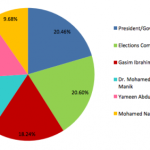The government has submitted two bills to parliament for introducing a green tax and revising import duties to raise additional revenue anticipated in the 2015 state budget.
The President’s Office explained in a press statement on Thursday (November 13) that the government submitted amendments to the Tourism Act to introduce a US$6 per day ‘green tax’ on tourist establishments with the exception of guesthouses.
“The government decided to introduce this tax, as the Maldives is a tourist destination and the lack of a safe waste management system is adversely affecting tourism industry, to pave the way for the establishment of an adequate environment-friendly waste management system, to make Maldivian tourism an environment-friendly industry, and to provide an environment-friendly service to tourists,” the statement read.
The amendment also specifies the powers of the Maldives Inland Revenue Authority to collect the green tax, the statement added.
Tourism Minister Ahmed Adeeb told the press last week that the green tax would be levied in November 2015 – 11 months after the abolition of the bed-tax, which will continue to be charged at US$8 a night until the end of this month.
Adeeb insisted that the green tax would not hinder the demand from tourists – especially from Europe – who would become “champions” of the Maldivian environment by paying the tax.
While some resort owners have suggested that the combination of the bed tax with the rise in Tourism Goods and Services Tax (T-GST) to 12 percent this month has affected bookings, Adeeb vowed there would be no further hikes in T-GST during the current administration’s five-year term.
Opposition MPs have meanwhile sought assurances from the government that proceeds from the green tax would be used to finance environmentally sustainable infrastructure projects such as sewerage and coastal protection in the islands and not for the state’s wage bill.
In his budget speech to parliament earlier this month, Finance Minister Abdulla Jihad noted that MVR3.4 billion (US$220million) was forecast from new revenue raising measures, which also includes acquisition fees from investments to special economic zones (SEZs), income from the home ownership programme, and leasing 10 islands for resort development.
Import duties
The government also submitted amendments to the Export-Import Act to revise customs duties or tariffs to reflect “changes in the price of import goods in the global market,” the President’s Office stated.
The latest monthly economic review from the Maldives Monetary Authority noted that “the International Monetary Fund (IMF) commodity price index fell in both monthly and annual terms in September 2014, by 4 percent and 9 percent, respectively.”
“The monthly and annual decline in commodity prices was attributed to the decline in petroleum, metal and food prices. The price of crude oil fell by 4 percent in monthly terms and by 12 percent in annual terms and stood at US$95.9 per barrel at the end of September 2014,” the review stated.
In April, parliament approved import duty hikes for a range of goods proposed by the government as a revenue raising measure.
Jihad meanwhile told the budget committee last week that the government was considering increasing custom duties “mostly for luxury items, or items that are harmful to the environment or health.”
The cabinet’s economic council has not yet finalised the import duty or tariff revisions, Jihad noted, though he did reveal that the items under consideration include tobacco, perfume, and vehicles.
Tariffs for tobacco would be raised from the current 150 percent to 300 percent, 100 to 150 percent for cars, and zero to 10 percent for perfume, Jihad said.
Asked if higher custom duties would lead to higher prices, Jihad said the impact on the inflation rate would have to be studied for a proper assessment, which would take time to complete.
At parliament’s budget debate last week, Maldivian Democratic Party (MDP) MP Eva Abdulla criticised the proposed import duty hikes, noting that the government has decided to waive tariffs for construction material or capital goods for new resorts with development stalled due to financial constraints.
The burden of higher prices of goods due to higher custom duties would be borne by the public, she argued.
Eva noted that Jihad told the budget committee of plans to increase import duty for foodstuff and petroleum products.
“Our question is why shouldn’t an income tax be introduced? When MDP submitted an income tax bill to parliament it wasn’t passed. But we are telling this government to introduce an tax and [tax] the affluent as well,” she said.





